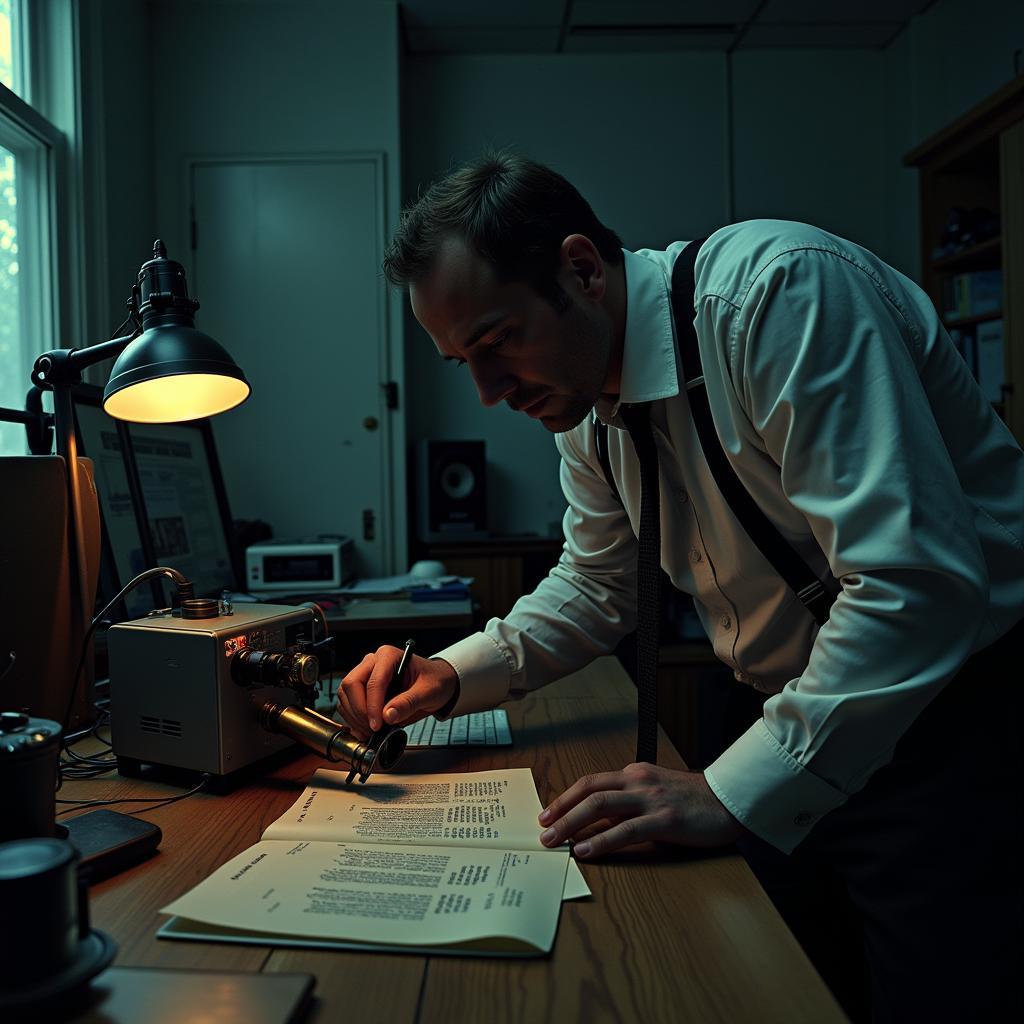The world of paranormal research, much like our universe, is shrouded in mystery. A realm where the unknown reigns supreme, where whispers of spectral encounters and unexplained phenomena send shivers down our spines. As we delve into these enigmatic territories, two crucial elements come into play: the Hypothesis Vs Research Question. These seemingly simple concepts are the compass and map guiding every paranormal researcher towards the truth.
A Question of Inquiry: Defining the Research Question
Imagine you’re investigating an old, abandoned asylum rumored to be haunted. You hear whispers, feel cold spots, and maybe even see shadowy figures. These observations spark your curiosity, leading you to formulate a research question. This question, broad in nature, seeks to explore the observed phenomena. For instance, “Is the abandoned asylum haunted?” serves as an excellent starting point for your investigation.
The research question acts as the guiding light, illuminating the path for your exploration. It doesn’t make assumptions or predictions, instead, it opens the door to a deeper understanding of the unknown. This question sets the stage for developing specific inquiries that can be tested and analyzed.
Venturing a Guess: Formulating the Hypothesis
With a research question in place, you move on to the next crucial step: formulating a hypothesis. A hypothesis is an educated guess, a tentative explanation for the observed phenomena. It stems from your initial research question but takes a more specific and testable form.
Returning to the haunted asylum example, a possible hypothesis could be: “If the asylum is haunted, then the presence of paranormal activity will be higher in areas where tragic events occurred.” This statement is testable. You can investigate those specific areas and compare your findings with other locations within the asylum.
The hypothesis, unlike the research question, is not open-ended. It proposes a specific relationship between variables and paves the way for designing experiments and collecting data. This structured approach distinguishes a hypothesis from a general query, making it a cornerstone of scientific inquiry.
Hypothesis vs Research Question: A Symbiotic Relationship
While distinct in their definitions, the hypothesis and research question are intricately connected. One cannot exist without the other. They are two sides of the same coin, each playing a vital role in unraveling the mysteries of the paranormal.
The relationship can be summarized as follows:
- The research question: Sets the stage, broadly defining the area of investigation.
- The hypothesis: Narrows the focus, providing a testable explanation for observed phenomena.
This interplay ensures a systematic and logical approach to paranormal research. The research question prevents the investigation from becoming too narrow, while the hypothesis provides a framework for collecting and analyzing data.
Applying the Principles: Real-World Paranormal Research
Let’s take another example to solidify the concept. Suppose you’re investigating claims of a haunted mirror said to induce vivid hallucinations in those who gaze into it.
- Research Question: Does the antique mirror cause hallucinations, and if so, how?
- Hypothesis: Individuals who gaze into the mirror will experience more frequent and intense hallucinations compared to those who do not.
 A researcher examines a seemingly ordinary mirror using a range of equipment, including thermal cameras, electromagnetic field detectors, and other specialized tools.
A researcher examines a seemingly ordinary mirror using a range of equipment, including thermal cameras, electromagnetic field detectors, and other specialized tools.
This example demonstrates how the research question and hypothesis work in tandem. The question establishes the broader phenomenon, while the hypothesis provides a testable statement about the mirror’s alleged influence.
Beyond the Veil: The Importance of Rigor in Paranormal Research
The debate of research question versus hypothesis highlights the importance of a structured approach in paranormal investigation. While intuition and personal experiences hold value, incorporating scientific principles lends credibility and strengthens findings.
By understanding and implementing the concepts of research questions and hypotheses, paranormal researchers can move beyond subjective interpretations and delve into the heart of unexplained phenomena, inching closer to unraveling the mysteries that have captivated humankind for centuries.
FAQs about Hypothesis and Research Questions
1. Can a research question have multiple hypotheses?
Absolutely! A single research question can lead to several hypotheses, each exploring different aspects of the phenomenon under investigation.
2. What if my hypothesis is proven wrong?
That’s perfectly fine! Disproving a hypothesis is just as valuable as proving it. It provides crucial information and helps refine the research question, leading to a deeper understanding of the subject.
3. Is it necessary to always have a hypothesis for paranormal research?
While not always mandatory, having a hypothesis adds structure and direction to your investigation. It encourages a more focused and analytical approach, leading to more meaningful conclusions.
4. Can I change my research question or hypothesis during the investigation?
Yes, research is an iterative process. As you gather more data and insights, you might need to adjust your research question or hypothesis to align with your findings.
5. Where can I find more information about research methods in paranormal investigation?
For those interested in diving deeper, consider exploring resources like “research question and hypothesis difference” and “research question versus hypothesis.” These articles offer further guidance on navigating the complexities of paranormal research.
Delve Deeper into the Paranormal
If you’re eager to learn more about research methods and their application in paranormal investigation, explore these related topics:
- Levels of research evidence nursing
- Analysis of data in quantitative research
- Which researchers suggested that language determines thought
Need Help with Your Paranormal Research?
Don’t hesitate to reach out to our team of experienced Paranormal Researchers at:
- Phone: 0904826292
- Email: research@gmail.com
- Address: No. 31, Alley 142/7, P. Phú Viên, Bồ Đề, Long Biên, Hà Nội, Việt Nam.
We are available 24/7 to assist you with any inquiries or challenges you may encounter on your journey into the unknown.